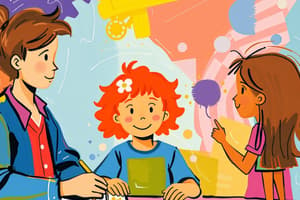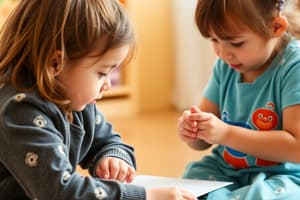Podcast
Questions and Answers
Children need an environment that allows all children to maximize their potential with a minimum amount of adult direction.
Children need an environment that allows all children to maximize their potential with a minimum amount of adult direction.
True (A)
Unlike the indoor classroom, the playground rules do not set limits of behavior for the children.
Unlike the indoor classroom, the playground rules do not set limits of behavior for the children.
False (B)
When a behavior occurs that is inappropriate, you need to address the behavior, not belittle the child.
When a behavior occurs that is inappropriate, you need to address the behavior, not belittle the child.
True (A)
All but which of the following is true when designing a learning environment for young children?
All but which of the following is true when designing a learning environment for young children?
When choosing equipment for your classroom, it is best to choose items with all but which of the following qualities?
When choosing equipment for your classroom, it is best to choose items with all but which of the following qualities?
All but which of the following is true when setting and enforcing limits in the classroom with young children?
All but which of the following is true when setting and enforcing limits in the classroom with young children?
An example of a transition is:
An example of a transition is:
In a well-planned indoor area of an early childhood school or center, the minimum usable space available per child should be:
In a well-planned indoor area of an early childhood school or center, the minimum usable space available per child should be:
As used in the text, the term transition refers to:
As used in the text, the term transition refers to:
Although we often talk about the environment in terms of materials, equipment, and other enhancements, it should set the stage for an experience that is:
Although we often talk about the environment in terms of materials, equipment, and other enhancements, it should set the stage for an experience that is:
Assessment refers to the collection of information for the purpose of making educational decisions about children or groups of children or to evaluate a program's effectiveness.
Assessment refers to the collection of information for the purpose of making educational decisions about children or groups of children or to evaluate a program's effectiveness.
An anecdotal record involves both an incident that was observed and the observer's interpretation of what was observed.
An anecdotal record involves both an incident that was observed and the observer's interpretation of what was observed.
One type of authentic assessment is the portfolio.
One type of authentic assessment is the portfolio.
The best way to observe children is in the room with them so that you can see everything they are doing.
The best way to observe children is in the room with them so that you can see everything they are doing.
Early childhood educators may assess children for all but which of the following reasons?
Early childhood educators may assess children for all but which of the following reasons?
All but which of the following is true of observation of young children for assessment purposes?
All but which of the following is true of observation of young children for assessment purposes?
An anecdotal record is:
An anecdotal record is:
Flashcards are hidden until you start studying
Study Notes
Environment and Behavior Management
- Children thrive in environments that foster potential with minimal adult intervention.
- Playground rules mirror indoor classroom limits, guiding children's behavior.
- Address inappropriate behavior directly, focusing on the action rather than the child.
Learning Environment Design
- Create welcoming, homelike spaces while implementing changes gradually.
- Avoid frequent significant alterations in the environment to maintain stability.
- Aim for environments that are both beautiful and functional.
Classroom Equipment Selection
- Choose robust, easy-to-clean, nontoxic equipment.
- Affordability of replacement items is not a primary concern.
Setting Limits and Transitions
- Limit rules to a few essential guidelines for effective self-regulation.
- Clearly explain the reasoning behind each rule.
- Transitions consist of activities such as cleanup, enabling smooth activity shifts.
Space Requirements
- Minimum usable space requirement per child in an early childhood center is 35 square feet.
Assessment and Observation
- Assessment involves gathering information to drive educational decisions and evaluate program effectiveness.
- An anecdotal record does not incorporate the observer's interpretations of incidents.
- Portfolios serve as a valid form of authentic assessment.
Acknowledging Effective Observation Practices
- Best observation occurs outside the immediate room context to capture comprehensive behavior.
- Assessment seeks to identify students needing additional support but does not diagnose disabilities.
- Observational assessment requires systematic collection rather than random watching.
Anecdotal Records
- Anecdotal records consist of detailed narrative accounts of specific incidents regarding a child's behavior.
Studying That Suits You
Use AI to generate personalized quizzes and flashcards to suit your learning preferences.




